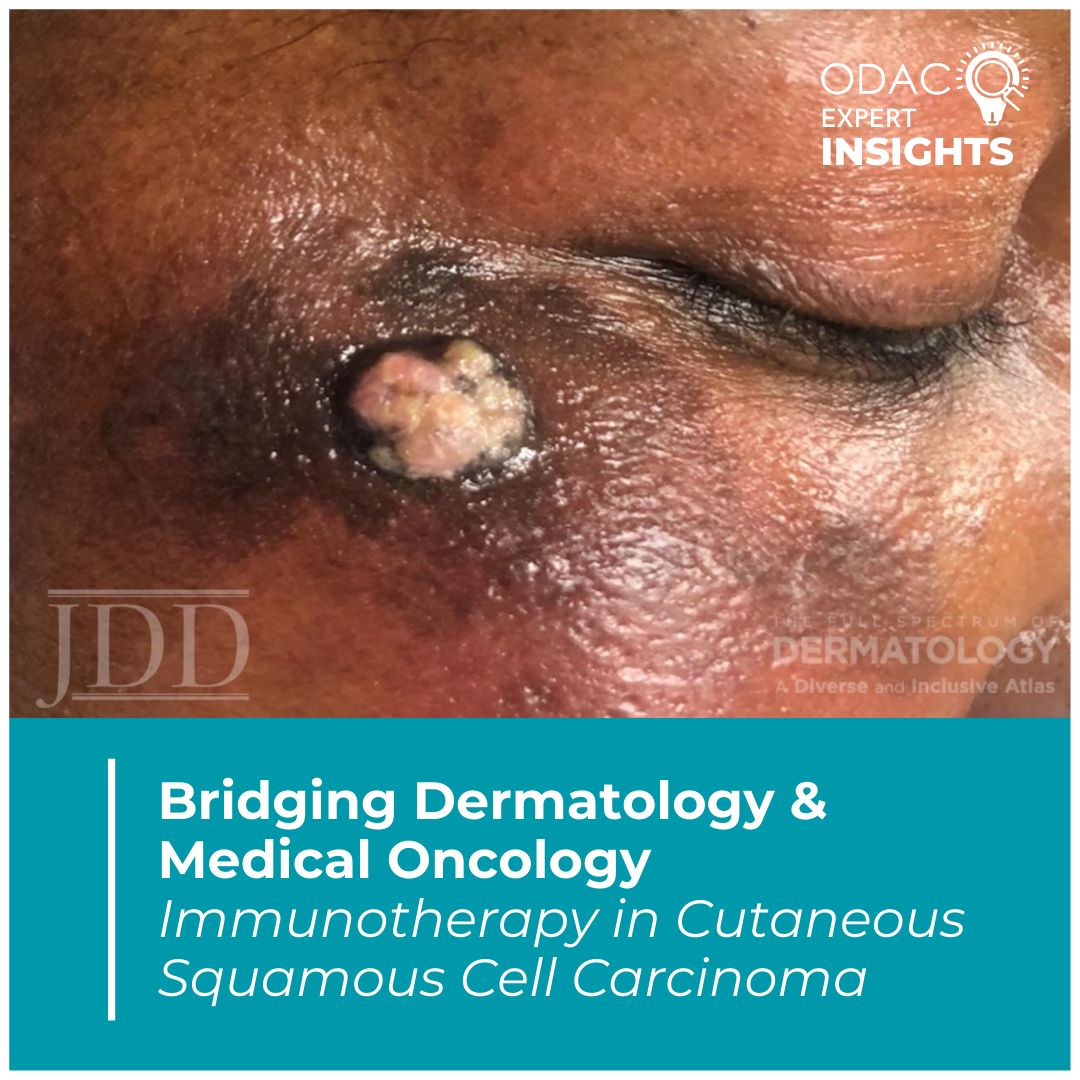At the forefront of the evolving treatment landscape for cutaneous squamous cell carcinoma (cSCC), Dr. David M. Miller—a board-certified internist, dermatologist, and medical oncologist at Massachusetts General Hospital—delivered a highly informative lecture on the past, present, and future of immunotherapy for cSCC at ODAC 2025. With his unique expertise across three disciplines, Dr. Miller emphasized the increasing convergence of dermatology and medical oncology through immunotherapeutic strategies, which are now being applied earlier and earlier in the disease course.
The Evolution of Immunotherapy for cSCC
Past: Early Beginnings to Rapid Advances
Dr. Miller traced the history of systemic therapies for skin cancer, beginning with the FDA’s approval of nitrogen mustard in 1949. After a period of stagnation in the 1980s, advancements in understanding the biology of skin cancer, including the MAPK and Hedgehog pathways, led to an explosion of approvals in the 2000s. Notably, cemiplimab gained FDA approval in 2018 for advanced cSCC, followed by pembrolizumab in 2020 and cosibelimab in 2024. These approvals marked a paradigm shift in the treatment of advanced cSCC.
Present: Expanding Indications
Dr. Miller highlighted the growing use of immunotherapy in earlier stages of cSCC, particularly as neoadjuvant and adjuvant therapies. He discussed several pivotal studies:
-
- Neoadjuvant Cemiplimab for Stage II to IV Cutaneous Squamous-Cell Carcinoma1: A phase 2 trial demonstrated a pathological complete response (pCR) in 51% of patients with resectable stage II-IV (M0) cSCC. Adverse events were noted in 87% of patients, though grade 3 or higher events occurred in only 18%.
- NEO-CESQ Study2: This trial combined neoadjuvant and adjuvant cemiplimab in high-risk, surgically resectable stage III/IV cSCC, achieving a 48% major pathological response (MPR).
- MATISSE Trial3: Investigating organ preservation, this trial demonstrated deep clinical responses in 50-61% of patients receiving neoadjuvant nivolumab, with some patients achieving durable remission without surgery.
- De-Squamate Study4: This phase 2 study used neoadjuvant pembrolizumab to guide surgical de-escalation in resectable cSCC, achieving a pCR, MPR, or clinical complete response (CCR) in 63% of patients.
Adjuvant Immunotherapy: Post-Surgical Advances
Immunotherapy is also being studied as adjuvant therapy for resected cSCC:
-
- R2810-ONC-1788 (Adjuvant Cemiplimab): Unpublished interim results from C-POST, a phase 3 study showed a 68% reduction in disease recurrence or death, positioning cemiplimab as the first immunotherapy to demonstrate significant benefits in this setting.
- KEYNOTE-630 (Adjuvant Pembrolizumab)5: Although initially promising, this trial was discontinued following an interim analysis that did not demonstrate an improvement in event-free survival or overall survival, the study’s primary endpoints.
Future Directions
Dr. Miller explored the exciting potential of immunotherapy as an immunoprophylactic strategy for high-risk patients. He introduced the ICARUS trial concept, hypothesizing that prophylactic anti-PD1 therapy could reduce the development of cSCC in patients with a history of multiple nonmelanoma skin cancers. Early intervention with immunotherapy may offer a new paradigm, shifting its use from advanced-stage treatment to prevention.
Key Takeaways
-
- The treatment landscape for cSCC has evolved dramatically over the past two decades.
- Immunotherapy, initially reserved for advanced cases, is now being studied in neoadjuvant, adjuvant, and early-stage settings.
- Early-phase studies suggest that neoadjuvant immunotherapy may elicit stronger immune responses by preserving tumor antigens and lymphatic structures.
- While toxicity remains a challenge, these therapies require significant expertise to manage effectively.
In conclusion, Dr. Miller’s lecture highlighted the transformative impact of immunotherapy in cSCC, bridging dermatology and oncology to improve outcomes across all stages of the disease.
References
-
- Gross ND, Miller DM, Khushalani NI, Divi V, Ruiz ES, Lipson EJ, Meier F, Su YB, Swiecicki PL, Atlas J, Geiger JL, Hauschild A, Choe JH, Hughes BGM, Schadendorf D, Patel VA, Homsi J, Taube JM, Lim AM, Ferrarotto R, Kaufman HL, Seebach F, Lowy I, Yoo SY, Mathias M, Fenech K, Han H, Fury MG, Rischin D. Neoadjuvant Cemiplimab for Stage II to IV Cutaneous Squamous-Cell Carcinoma. N Engl J Med. 2022 Oct 27;387(17):1557-1568. doi: 10.1056/NEJMoa2209813. Epub 2022 Sep 12. PMID: 36094839; PMCID: PMC9844515.
- Paolo Antonio Ascierto et al., NEO-CESQ study: Neoadjuvant plus adjuvant treatment with cemiplimab in surgically resectable, high risk stage III/IV (M0) cutaneous squamous cell carcinoma.. JCO41, 9576-9576(2023). DOI:10.1200/JCO.2023.41.16_suppl.9576
- Charlotte L. Zuur et al., Towards organ preservation and cure via 2 infusions of immunotherapy only, in patients normally undergoing extensive and mutilating curative surgery for cutaneous squamous cell carcinoma: An investigator-initiated randomized phase II trial—The MATISSE trial.. JCO41, 9507-9507(2023). DOI:1200/JCO.2023.41.16_suppl.9507
- Rahul Ladwa et al., A phase 2 study of de-escalation in resectable, locally advanced cutaneous squamous cell carcinoma (cSCC) with the use of neoadjuvant pembrolizumab: De-Squamate.. JCO42, 9514-9514(2024). DOI:1200/JCO.2024.42.16_suppl.9514
- Jessica Lyn Geiger et al., KEYNOTE-630: Phase 3 study of adjuvant pembrolizumab versus placebo in patients with high-risk, locally advanced cutaneous squamous cell carcinoma.. JCO37, TPS9597-TPS9597(2019). DOI:1200/JCO.2019.37.15_suppl.TPS9597
This information was presented by Dr. David Miller at the 2025 Annual ODAC Dermatology, Aesthetic and Surgical Conference held January 17–20, 2025 in Orlando, FL. The above highlights from his lecture were written and compiled by Fahad Siddiqui, DO, a PGY-3 dermatology resident at the Kansas City University ADCS Orlando Dermatology Residency Program. Dr. Siddiqui was one of the five residents selected to participate in the Young Dermatology Leader Mentorship Program sponsored by Sun Pharma and organized by Derm In-Review.

